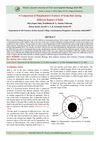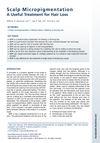 1 citations,
January 2013 in “Chronicles of young scientists”
1 citations,
January 2013 in “Chronicles of young scientists” Immuno-cosmeceuticals from chicken egg yolk can effectively repair and improve damaged hair.
 December 2022 in “Kristu Jayanti Journal of Core and Applied Biology (KJCAB)”
December 2022 in “Kristu Jayanti Journal of Core and Applied Biology (KJCAB)” Scalp hair characteristics vary across different regions of India and can help identify a person's origin.
 8 citations,
August 2018 in “Anais Brasileiros De Dermatologia”
8 citations,
August 2018 in “Anais Brasileiros De Dermatologia” Portuguese WAA-QoL questionnaire validated; FPHL severity, schooling, and phototypes affect patients' quality of life.
 5 citations,
January 2020 in “Skin Research and Technology”
5 citations,
January 2020 in “Skin Research and Technology” Minoxidil 5% works better than 2% for hair growth in male-patterned hair loss.

Premature greying of hair affects the social lives of medical students but not their self-esteem.
 November 2020 in “Skin Research and Technology”
November 2020 in “Skin Research and Technology” Videodermoscopy better identifies female hair loss than clinical diagnosis.
25 citations,
May 2019 in “Cosmetics” 18-MEA and cationic surfactants can restore and maintain hair's hydrophobic nature, improving its beauty and feel.
 24 citations,
August 2013 in “Facial Plastic Surgery Clinics of North America”
24 citations,
August 2013 in “Facial Plastic Surgery Clinics of North America” SMP is a medical tattoo for hair loss, improving appearance and camouflaging scars, but requires skill and has limitations.
October 2024 in “Cosmetics” ATG effectively reduces hair frizz without damaging hair strength.
 February 2024 in “International Journal of Dermatology”
February 2024 in “International Journal of Dermatology” The document concludes that more local research on African skin and hair is needed despite increased scientific output from Sub-Saharan Africa.
Frizzy hair is fragile and can lead to hair loss and damage if not properly cared for.
 180 citations,
September 1999 in “British Journal of Dermatology”
180 citations,
September 1999 in “British Journal of Dermatology” Hair loss affects self-esteem and quality of life; treatments can help.
81 citations,
December 2007 in “Acta materialia” AFM helped show how hair changes under tension and the effects of damage and conditioner.
 72 citations,
July 2008 in “Dermatologic Therapy”
72 citations,
July 2008 in “Dermatologic Therapy” CCCA is a scarring hair loss condition mainly in African descent women, possibly caused by genetics and hairstyling, treated with gentle hair care and medications.
 43 citations,
November 1992 in “International Journal of Dermatology”
43 citations,
November 1992 in “International Journal of Dermatology” Minoxidil 2% effectively treats female hair loss, promoting growth and density.
40 citations,
January 2018 in “International journal of trichology” Healthy scalp reduces hair loss by managing oxidative stress.
 12 citations,
February 2014 in “Recent Patents on Inflammation & Allergy Drug Discovery”
12 citations,
February 2014 in “Recent Patents on Inflammation & Allergy Drug Discovery” Shampoos have evolved into multifunctional products with patented innovations for different hair needs and can include medicinal herbs for hair and scalp health.
3 citations,
January 2018 in “International Journal of Trichology” The new system helps detect and track early female hair loss better.
2 citations,
July 2023 in “Cosmetics” Surfactants in shampoos and conditioners remove some but not all lipids from hair, and more research is needed to understand their full impact.
 June 2024 in “Annals of Medicine and Surgery”
June 2024 in “Annals of Medicine and Surgery” A 23-year-old Syrian woman has two rare hair disorders, and avoiding hair treatments plus using vitamins and minoxidil may help.

Hair fiber research combines multiple sciences to improve hair care products.
October 2023 in “Nutrients” Millet and wheat extracts may improve hair health and promote growth.
 February 2023 in “JEADV Clinical Practice”
February 2023 in “JEADV Clinical Practice” Biotin supplements significantly improved a young girl's uncombable hair.

The document concludes that understanding hair's composition and the effects of treatments can lead to better hair care products.
 103 citations,
June 2007 in “Endocrinology and Metabolism Clinics of North America”
103 citations,
June 2007 in “Endocrinology and Metabolism Clinics of North America” Male pattern hair loss is genetic and influenced by hormones, with treatments like minoxidil and surgery available.
 77 citations,
April 1999 in “Dermatologic Clinics”
77 citations,
April 1999 in “Dermatologic Clinics” The document concludes that follicular unit transplantation offers more natural results and better graft survival than older hair transplant methods.
 45 citations,
September 2018 in “International Journal of Women's Dermatology”
45 citations,
September 2018 in “International Journal of Women's Dermatology” PRP shows promise for hair loss treatment, with three initial monthly injections and maintenance every 3-6 months.
 37 citations,
September 1996 in “Journal of The American Academy of Dermatology”
37 citations,
September 1996 in “Journal of The American Academy of Dermatology” Treat genetic hair loss early with FDA-approved medications and consider hair transplantation.
36 citations,
August 2012 in “Dermatology online journal” Using wigs, hairpieces, and sprays can help people with hair loss feel better about themselves.
35 citations,
October 2000 in “Dermatologic clinics” A scarring hair loss condition mainly affects middle-aged women of African descent, impacting their quality of life, with treatments more effective when started early.




















